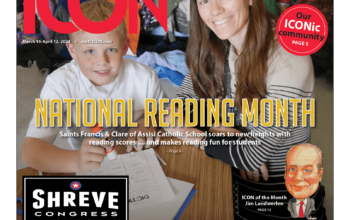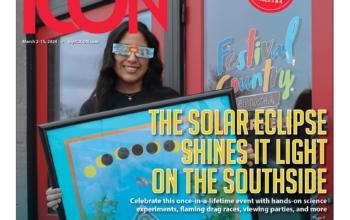By Mark Ambrogi
When the Indiana Pacers played in the NBA bubble in Orlando because of the COVID-19 pandemic during the summer of 2020, David Benner came to a realization.
“I was home and watched on TV and I could monitor the postgame,” said the longtime director of media relations.
Then he could call it a night.
Had he been at a home game, he wouldn’t have gotten home until 11:30 or if on the road, the plane might not get back until 3 a.m.
“When you are young it’s fine, but the older you get it’s ‘how much longer do I want to do this?’” he said.
Still he wasn’t quite ready. He didn’t want to go out after the 2020-21 season when crowds and traveling were limited by the pandemic.
The Greenwood resident, who lives a short distance from his alma mater Center Grove High School, decided the 2021-22 season would be his last season.
It was time, he reasoned.
“I’m 66 and doing it for 28 years,” said Benner, who said he was mostly a consultant this season. “There had been some health issues, too.”

In 2010, Benner was diagnosed with stage 3 colon cancer, and he went into remission. The cancer returned in 2019 in the fatty tissue of his stomach. He has a treatment every two weeks and undergoes chemotherapy.
“There are good days and bad days,” he said. “It’s something you have to deal with.”
Benner, whose retirement becomes effective June 30, said he had would have liked the Pacers to go out with a stronger season, maybe make playoffs or play-in game, but it wasn’t to be. Still Benner got to make final trips to most places around the league to say goodbye to many friends in various cities.
The most emotional goodbyes came at home in the Pacers’ second-to-last home game. During a pregame presentation, Reggie Miller surprised him. Benner was clearly moved as they embraced. During halftime of the April 3 game, Pacers radio broadcaster Mark Boyle interviewed Miller and Benner on court.
“The thing with Reggie is it was very much a professional relationship that grew into a personal relationship,” Benner said. “He was the focal point for the team, and he was in demand. We ended up developing a mutual respect for one another for what we had to do.”
In his role, Benner had to go to the players almost every day with some request.
“When you have a Hall of Fame type player like Reggie everyone wants a piece of him,” he said. “You get so many requests that I had to deal with him every day. Bless his heart, he understood that. Did he agree to everything? No. If I recommended something he do, by and large, he would cooperate with it.”
Miller told the crowd how Benner never sugarcoated anything.
“That’s the only thing as a professional athlete, and anyone in any walk of life, you want to be told the truth,” Miller said.
After Miller retired, they stayed in touch because of that personal relationship.

“When he came back, it was obviously very emotional because it was totally unexpected,” Benner said. “That was extremely meaningful.”
The two also shared a pregame routine. The superstitious Miller once took a drink from Benner before the game and had a good game. Soon it became a ritual that Benner had to take a drink to Miller. Benner said one time Miller made him wait until just before the game started to grab the drink, so Benner said he cussed him out. So they began to point fingers, exchange colorful language as well as a drink.
“It became our thing, our bonding experience,” Miller said.
Before Benner joined the Pacers in 1994, he had been on the other side as a sportswriter for The Indianapolis Star. He was on the Pacers beat for eight seasons, starting in 1983, and built relationships with team officials.
Benner said he was blessed to work with some great general managers, starting with Donnie Walsh.
Benner enjoyed the quirkiness of Larry Brown and straightforwardness of Larry Bird.
“Contrary to what people might think Larry Bird was not difficult to deal with,” Benner said. “You know where he was coming from at all times.”
This was the second time Benner has dealt with Rick Carlisle as head coach as Carlisle returned to coach in 2021.
“I want to thank David for everything he’s done for me and others, it’s been an epic run,” Carlisle said.
Benner said Carlisle and others have helped make it an enjoyable run as well.

““I’d say 95 percent of the coaches, players and administrators have been easy to work with,” Benner said. “They understand the media spotlight they are in; this is not a major media market. At the same time we are one of two major league franchises in the city that gets a lot of attention in good times and bad. When things are going good, everyone loves you. If things go bad, it’s a black eye on the market and it becomes amplified a little bit more in a smaller market because you are one of two biggies. That’s something you have to understand. Over the years, I thought we got treated very fairly by the media and the fans.”
Benner said the team obviously took its hits with some off-the-court incidents and the 2004 melee in Detroit where Pacers players Ron Artest and Stephen Jackson went into the stands after Artest was hit with a drink. Punches were thrown and suspensions followed.
“That’s part of being in the spotlight,” he said. “You have to look objectively because by and large, you got treated pretty fairly.”
Benner was not with the team when the brawl in Detroit happened. But he watched on TV and made sure he was there at the airport to talk to the team, knowing there would be media there.
“I told them, ‘don’t talk to anybody and exit carefully,’” he said. “It was obvious the way it occurred there were going to be legal ramifications. It’s the old saying, ‘anything you say can and will be used against you in a court of law.’”
As a former sportswriter, Benner understood the media’s role better than many of his media relations counterparts, who didn’t have that background.
‘I’ve been blessed to have two jobs that are very enjoyable,” Benner said. “I missed the writing and creativity part of it. I liked the day-to-day excitement of the sports department. It wasn’t much different than this job; every day you don’t know what was going to happen. That’s what made it so interesting and rewarding.”

